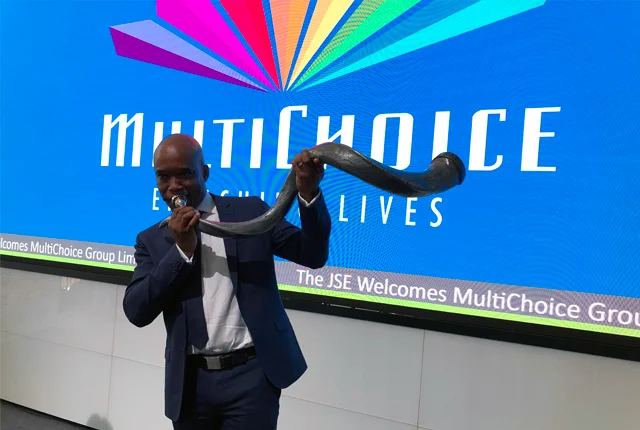French media company, Canal+ Group has acquired a stake in Multichoice Group, Africa’s biggest pay-TV company. Canal+ now holds a 6.5% stake in the South African company according to a notice posted Monday by Multichoice on the news service of the Johannesburg Stock Exchange (JSE SENS).
Canal+ has been buying shares in the publicly-traded pay-TV company since April, Multichoice told TechCentral. “[But we] received notification that their shareholding has now increased to 6.5%, thereby exceeding the 5% threshold that requires us to inform our shareholders through the JSE, as well as the Takeover Regulation Panel.”
The French company has become the fourth-largest shareholder at Multichoice, behind Prudential Portfolio Managers (9%), Allan Gray (10.1%) and Public Investment Corp (13.4%).
In its notice to the JSE, Multichoice said it “regularly engages with its strategic partners and maintains an open dialogue with the investment community. The Group’s policy is not to comment on its individual shareholders nor on its interactions with them.”
Headquartered in France, Canal+ is France’s biggest pay-TV company with 20.4 million total subscribers with around 8.6 million of them in mainland France. It is owned by French media conglomerate, Vivendi, which also owns Universal Music Group, the global music corporation, and Gameloft, the game maker.
Canal+’s growth history in Africa
Over the last four years, Canal+ has increased its focus on Africa where it has operated primarily in francophone Africa. Outside France, its largest market is Africa.
Canal+ had 1 million subscribers on the continent in 2013 but expanded very quickly since then, adding over 2 million new subscribers by 2018. By the end of 2018, it gained around 568,000 new subscribers and another 233,000 new users in the first half of 2019.
And by July 2019, Canal+ had 4.3 million African subscribers across 25 countries, according to media industry publication, Nextv News. As TV penetration improves in francophone Africa, pay-TV subscription is expected to rise.
Meanwhile, Canal+ has grown on the continent by spending heavily on original content including series and news programmes. Since 2013 it has added new channels offering local content including Nollywood TC, Nollywood Epic, and A+. In 2018, Canal+ started producing local content within rather than in Europe or the US, mostly because it is cheaper in Africa. One example is the “Invisibles” which was produced in Ivory Coast.
To bolster its content pool of 5,000 movies, Canal+ made an important acquisition in July 2019. It acquired ROK from Iroko, the Nigerian streaming company. That acquisition has three sides to it.
First is the sale of ROK Studios, a production company founded by Mary Njoku, an actress and wife of Iroko CEO, Jason Njoku. By 2019, ROK Studios had produced over 540 movies and 25 TV series with a production budget of less than $20,000 per movie.
Second, Canal+ takes control of distribution rights to ROK’s content including past content. And third, Canal+ assumes control of ROK’s four TV stations three of which are available on DStv and one on Sky in the UK and Ireland.
While the acquisition is important, Canal+ has publicly commented that the real value is the talents of Ms Njoku.
“We are acquiring the talent of Mary,” Canal+ Chief Content Officer Fabrice Faux told TechCrunch last year. “We will provide administrative support, finance and equipment, but otherwise it is our intention to give Mary maximum autonomy and creative freedom,” he said.
Ms Njoku would continue to lead Canal+’s ROK as Director-General.
The ROK deal which gives Canal+ rich library of Nollywood content hints that the company has plans to expand beyond French-speaking Africa. True to this, it is expanding to Ethiopia. Beginning in 2021, it will offer direct-to-home or digital satellite programming to the country’s 100 million people.
Beyond the ROK acquisition, Canal+ has also provided francophone Africa, an underserved TV market, with access to live sports content through a recent partnership with BeinSports and a Bundesliga licence.
Canal+’s growing presence in Africa’s pay-TV market has effectively turned the market into a three-horse race. Although it has a niche geographical focus, the French company is vying for market leadership with Multichoice, and most importantly, StarTimes, the Chinese pay-TV company.
This raises an important question: why acquire a stake in Multichoice?
The Multichoice choice: Canal+ and takeovers
This is a curious case.
According to Omdia, Multichoice is not the first African pay-TV company Canal+ will invest in. Research shows it invested $2.5 million in UK-based Iroko in 2018 way before the acquisition of ROK. Iroko is a relatively small but important player in Africa’s pay-TV industry. But with Multichoice, things are sort of complicated.
Over the last decade, Canal+’s parent company Vivendi has built a reputation for engaging in hostile takeovers. Under Vincent Bolloré, chairman of Vivendi’s supervisory board until 2018, the French conglomerate would gradually buy a minority stake in a company before mounting aggressive takeover attempts.
The Bolloré family owns 26.28% of Vivendi, making them the single largest shareholder in the company. Yannick Bolloré took over from the older Bolloré, his father, in 2018 but remains “committed and fully supportive of the Vivendi strategy over the past three years.”
That strategy includes hostile takeovers.
In October 2015, Vivendi spent around €180 million to acquire minority stakes in two publicly-traded gaming companies Gameloft (6.2%) and Ubisoft (6.6%), both owned by French family, the Guillemot brothers. It went on an aggressive acquisition strategy after that, buying up over 10% of shares in each company.
By February 2016, it made a hostile takeover of Gameloft, first by owning over 30% of the company and, later, by convincing other shareholders to sell their stakes. By June 2016, Gameloft became a subsidiary of Vivendi.
It didn’t stop there. Vivendi went after Ubisoft, Gameloft’s sister company. By June 2016, it owned 17.7% of the company. Two years later that stake increased to 27.3%. But Ubisoft’s CEO, Yves Guillemot and his brothers fought back, forcing the French media behemoth to sell all its stakes by March 2018 for $2.4 billion.
Vivendi may be attempting the same at Multichoice.
The South African company told regulators and shareholders that Canal+ had been buying its shares since April. It said it will “not comment on its individual shareholders nor on its interactions with them.” Canal+ has also not responded to TechCabal’s request for comments as at press time.
However, South African regulation regarding foreign shareholders in the media industry gives Multichoice an upper hand should the French Vivendi and Canal+ attempt a takeover. Under South African law, no foreign entity can own more than 20% of voting rights at a broadcasting company.
Multichoice has already alerted investors that it is permitted to reduce the voting rights “so that the aggregate voting power of MultiChoice shares that are presumptively owned or held by foreigners to South Africa will not exceed 20% of the total voting power.”
In its 2020 integrated annual report, foreign shareholders held 35.7% of Multichoice’s shares (not voting rights) compared to 48.1% for domestic shareholders.
So even if Canal+ and Vivendi do attempt a takeover, there’s little chance they’ll get control of the company as they’ve done elsewhere. That still raises one question: why did Canal+ buy up so much stake in Multichoice so quickly?





















